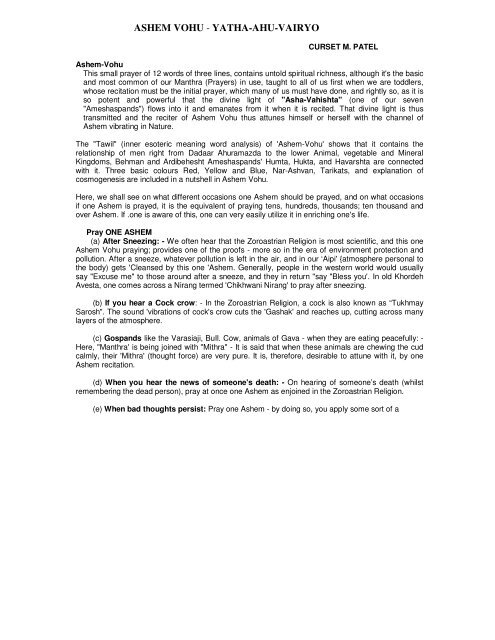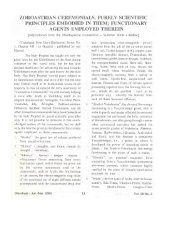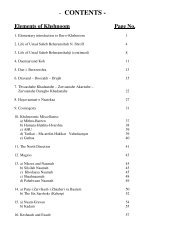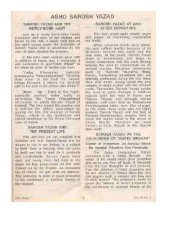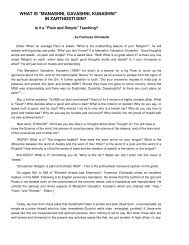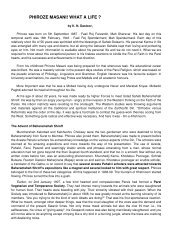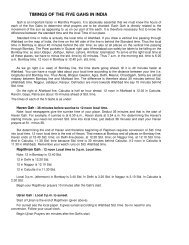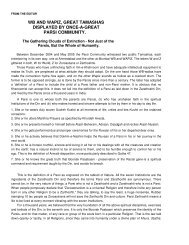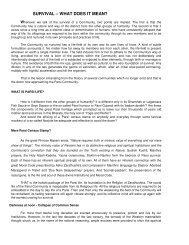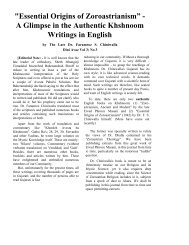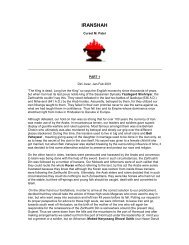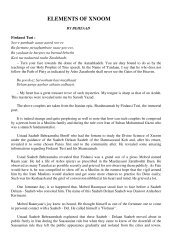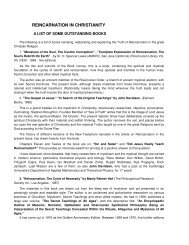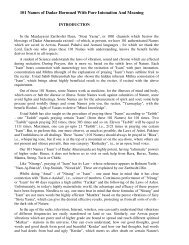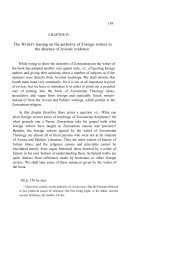yatha-ahu-vairyo - Traditional Zoroastrianism: Tenets of the Religion
yatha-ahu-vairyo - Traditional Zoroastrianism: Tenets of the Religion
yatha-ahu-vairyo - Traditional Zoroastrianism: Tenets of the Religion
Create successful ePaper yourself
Turn your PDF publications into a flip-book with our unique Google optimized e-Paper software.
ASHEM VOHU - YATHA-AHU-VAIRYO<br />
CURSET M. PATEL<br />
Ashem-Vohu<br />
This small prayer <strong>of</strong> 12 words <strong>of</strong> three lines, contains untold spiritual richness, although it's <strong>the</strong> basic<br />
and most common <strong>of</strong> our Manthra (Prayers) in use, taught to all <strong>of</strong> us first when we are toddlers,<br />
whose recitation must be <strong>the</strong> initial prayer, which many <strong>of</strong> us must have done, and rightly so, as it is<br />
so potent and powerful that <strong>the</strong> divine light <strong>of</strong> "Asha-Vahishta" (one <strong>of</strong> our seven<br />
"Ameshaspands") flows into it and emanates from it when it is recited. That divine light is thus<br />
transmitted and <strong>the</strong> reciter <strong>of</strong> Ashem Vohu thus attunes himself or herself with <strong>the</strong> channel <strong>of</strong><br />
Ashem vibrating in Nature.<br />
The "Tawil" (inner esoteric meaning word analysis) <strong>of</strong> 'Ashem-Vohu' shows that it contains <strong>the</strong><br />
relationship <strong>of</strong> men right from Dadaar Ahuramazda to <strong>the</strong> lower Animal, vegetable and Mineral<br />
Kingdoms, Behman and Ardibehesht Ameshaspands' Humta, Hukta, and Havarshta are connected<br />
with it. Three basic colours Red, Yellow and Blue, Nar-Ashvan, Tarikats, and explanation <strong>of</strong><br />
cosmogenesis are included in a nutshell in Ashem Vohu.<br />
Here, we shall see on what different occasions one Ashem should be prayed, and on what occasions<br />
if one Ashem is prayed, it is <strong>the</strong> equivalent <strong>of</strong> praying tens, hundreds, thousands; ten thousand and<br />
over Ashem. If .one is aware <strong>of</strong> this, one can very easily utilize it in enriching one's life.<br />
Pray ONE ASHEM<br />
(a) After Sneezing: - We <strong>of</strong>ten hear that <strong>the</strong> Zoroastrian <strong>Religion</strong> is most scientific, and this one<br />
Ashem Vohu praying; provides one <strong>of</strong> <strong>the</strong> pro<strong>of</strong>s - more so in <strong>the</strong> era <strong>of</strong> environment protection and<br />
pollution. After a sneeze, whatever pollution is left in <strong>the</strong> air, and in our ‘Aipi' {atmosphere personal to<br />
<strong>the</strong> body) gets 'Cleansed by this one 'Ashem. GeneralIy, people in <strong>the</strong> western world would usually<br />
say "Excuse me" to those around after a sneeze, and <strong>the</strong>y in return "say "Bless you'. In old Khordeh<br />
Avesta, one comes across a Nirang termed 'Chikhwani Nirang' to pray after sneezing.<br />
(b) If you hear a Cock crow: - In <strong>the</strong> Zoroastrian <strong>Religion</strong>, a cock is also known as “Tukhmay<br />
Sarosh". The sound 'vibrations <strong>of</strong> cock's crow cuts <strong>the</strong> 'Gashak' and reaches up, cutting across many<br />
layers <strong>of</strong> <strong>the</strong> atmosphere.<br />
(c) Gospands like <strong>the</strong> Varasiaji, BuIl. Cow, animals <strong>of</strong> Gava - when <strong>the</strong>y are eating peacefully: -<br />
Here, "Manthra' is being joined with "Mithra" - It is said that when <strong>the</strong>se animals are chewing <strong>the</strong> cud<br />
calmly, <strong>the</strong>ir 'Mithra' (thought force) are very pure. It is, <strong>the</strong>refore, desirable to attune with it, by one<br />
Ashem recitation.<br />
(d) When you hear <strong>the</strong> news <strong>of</strong> someone's death: - On hearing <strong>of</strong> someone’s death (whilst<br />
remembering <strong>the</strong> dead person), pray at once one Ashem as enjoined in <strong>the</strong> Zoroastrian <strong>Religion</strong>.<br />
(e) When bad thoughts persist: Pray one Ashem - by doing so, you apply some sort <strong>of</strong> a
eak on bad thoughts.<br />
(f) When you go to meet someone important, you’re superior in <strong>the</strong> <strong>of</strong>fice etc.: -<br />
To become successful in your mission/work and/or to reduce difficulties, pray one Ashem.<br />
Also,<br />
(g) When you light a lamp/diva, or when light or lamp gets extinguished.<br />
Note: A Zoroastrian is supposed to protect and preserve fire in any form anywhere. By<br />
blowing lighted candles on <strong>the</strong> cake, ignorant parents encourage <strong>the</strong>ir <strong>of</strong>fspring’s from a very<br />
young age to flout one <strong>of</strong> <strong>the</strong> most fundamental tenets <strong>of</strong> <strong>the</strong> Zoroastrian religion. It is not<br />
surprising in modern times to find <strong>the</strong> parents <strong>the</strong>mselves cooking a snook at <strong>the</strong> teachings <strong>of</strong> our<br />
prophet. Why, we have seen in some Parsee households even westernized doddering dowagers<br />
indulge in such irreligious acts <strong>of</strong> <strong>the</strong>ir own birthdays! Your question, <strong>the</strong>refore, if this should be<br />
“tolerated” only provokes a couple <strong>of</strong> counter-questions: What is <strong>the</strong> remedy? Who has <strong>the</strong><br />
authority to prevent <strong>the</strong>m from committing such sacrilegious acts? All we can say is, to each his<br />
own. Everyone will see TRUTH in <strong>the</strong> face <strong>of</strong> <strong>the</strong> dawn <strong>of</strong> <strong>the</strong> fourth day after death.<br />
The late Dr. Sir Jivanji Modi, in his “The Religious Ceremonies and Customs <strong>of</strong> <strong>the</strong> Parsees”,<br />
states that, “No religious rites <strong>of</strong> ceremonies are enjoined as necessary on <strong>the</strong> birthday <strong>of</strong> a<br />
Parsee child…After a bath and a new suit <strong>of</strong> clo<strong>the</strong>s, <strong>the</strong> child is generally sent with some sandalwood<br />
to an adjoining Fire temple.<br />
(h) When you remember your dear departed relatives / friends;<br />
(i) When you come into contact with some Drui - evil or Nasa etc., pray one Ashem.<br />
Pargard 1 <strong>of</strong> "Hadokhta Nask" narrates a Divine dialogue between Ahura Mazda and<br />
Zarthushtra on "Ashern Vohu". The efficacy <strong>of</strong> devotionally recited only one Ashem Vohu is so<br />
great that its value increases in' accordance with <strong>the</strong> various particular circumstances or events<br />
and time from 10 Ashem to Infinite Ashem.<br />
Zarthust Sahib asks Dadaar Ahura Mazda when will just one Ashern Vohu recital be<br />
equivalent in value to reciting 10 Ashem Vohu.<br />
Answer: - When one sits to have his food and thinking <strong>of</strong> Humata, Hukhta, Havarashta i.e. all<br />
<strong>the</strong> divine work <strong>of</strong> <strong>the</strong> Yazatas going on in Nature, and shunning bad thoughts, words and deeds,<br />
if one prays one Ashem, it is equivalent to 10 Ashem Vohu.<br />
(2) Similarly, when one prays one Ashem whilst drinking <strong>the</strong> duly crushed 'Haoma' water -<br />
<strong>the</strong>n its value is like praying 100 Ashern.<br />
(3) In sleep, while turning - changing one's side in bed - if one prays one Ashem, <strong>the</strong>n its<br />
value is that <strong>of</strong> 1000 Ashem, recited at any o<strong>the</strong>r time.<br />
(4) In <strong>the</strong> morning, as soon as your eyes open - on awakening - if one Ashem is prayed it is<br />
equivalent in worth as praying 10,000 Ashem.<br />
Needless to say that on each <strong>of</strong> <strong>the</strong> above occasions, Ashem should be accompanied with<br />
<strong>the</strong> thought <strong>of</strong> ascribing; Humta, Hukhta, Havarashta and discarding Dushmata, Dujukhta and<br />
Dujavarshta - <strong>the</strong>n only <strong>the</strong> value <strong>of</strong> Ashern increases in its divine stature (goodness and beauty).<br />
At this juncture <strong>of</strong> <strong>the</strong> questioning, <strong>the</strong> quantitative formula- changes to <strong>the</strong> qualitative one.<br />
Zarthusht Sahib asks Ahura Mazda: When is one Ashem, prayed in its splendor, goodness<br />
and beauty, worth as much as <strong>the</strong> entire region <strong>of</strong> "Khanirath Baami” Keshvar with its creation?
Answer: - When one human being recites one Ashem at <strong>the</strong> last moment <strong>of</strong> one's life, thinking<br />
<strong>of</strong> Humata, Hukhta and Hvarashta - i.e. all <strong>the</strong> divine work <strong>of</strong> <strong>the</strong> Yazata's going on in Nature.<br />
Q). 2. Which is one Ashem when prayed worth as much as all that is in and between <strong>the</strong><br />
earth and <strong>the</strong> sky (i.e. worlds, material - spiritual - divine)?<br />
Answer: - When a human being recites one Ashem after renouncing forever <strong>the</strong> bad thoughts,<br />
words and deeds – when <strong>the</strong> human has converted all his evil into good and thus has attained <strong>the</strong><br />
higher stage <strong>of</strong> Nar-Ashvan.<br />
There is a vast difference between Ashem prayed by us, <strong>the</strong> worldly mortals, and that prayed<br />
by an Ashavan, <strong>the</strong> one who has renounced all evil and is climbing <strong>the</strong> ladder <strong>of</strong> Ashoi upward.<br />
His Ashem is more powerful and straightaway reaches higher. Ours naturally requires an effect<br />
as laid down in <strong>the</strong> formula <strong>of</strong> <strong>the</strong> Hadokht Nask.<br />
Dini-Avaz Jan.-Feb. 2000<br />
YATHA - AHU - VAIRYO<br />
The above three lines <strong>of</strong> 21 words stands in Avesta prayers as one <strong>of</strong> <strong>the</strong> most mysterious prayer, an<br />
oldest, and powerful. We, Zarthoshtis, learn Yatha and Ashem as our basic recitation <strong>of</strong> prayers and utter<br />
<strong>the</strong> same throughout our life, knowing at maximum, if at all, that it is powerful. Our 21 Nasks bear each<br />
word <strong>of</strong> Yatha as heading, and some different number <strong>of</strong> Yathas are to be prayed for some different Avesta<br />
prayers. But far from it, by going deep into it or trying to understand its esoteric side, one will find that it<br />
could fill a volume, which is not possible here but still in a nutshell or as a very light rough outline. Let us<br />
try and understand. In recitation, prayer <strong>of</strong> Yatha is <strong>the</strong> best <strong>of</strong> <strong>the</strong> best, in each word <strong>of</strong> Yatha <strong>the</strong>re is<br />
depth, which we cannot fathom nor understand completely.<br />
The one and only, <strong>the</strong> Great one who has no name, no creator, is <strong>the</strong>re but not <strong>the</strong>re, is in everything,<br />
unknown, source <strong>of</strong> all sources - before creating <strong>the</strong> universe, took out an order, law - "Vairya", which is<br />
known as "Ahunavairya". Yazashni 19 Ha explains about this mystery. When this "Vairya" was taken<br />
out it was living, was Yazad <strong>of</strong> Yazads, absolute obedient, without limit, Completely Knowledgeable, as<br />
whose extension 'Fravashi', came into being - after which <strong>the</strong> universe was created. Fravashi goes on<br />
praying "Ahunavairya" continuously, that is why it has knowledge <strong>of</strong> <strong>the</strong> whole universe.<br />
The music <strong>of</strong> 'Ahunavairya' is in and connected with 'Fravashi' and Yazdi power, as well as around<br />
all that is in <strong>the</strong> universe, which is termed "Ahunvar-noNaad". This Naad reminds each and<br />
everything <strong>of</strong> <strong>the</strong> universe through consciousness continuously <strong>of</strong> <strong>the</strong> Great one. Hence, <strong>the</strong><br />
"Naad <strong>of</strong> Ashem" is also present. Between <strong>the</strong>se two 'Naads <strong>the</strong>re is "Naad <strong>of</strong> Yanghe-Hatam"<br />
which is as joiner <strong>of</strong> Ashem and Yatha Naads, and when this will happen, <strong>the</strong> universe which is<br />
made out <strong>of</strong> Ahunavar, will get relieved <strong>of</strong> its sin, and will meet <strong>the</strong> Great one, by which each and<br />
everything will get transmitted in shinning light - Farshogard (Renovation).<br />
As mentioned above, this is <strong>the</strong> very thin and limited rough outline <strong>of</strong> <strong>the</strong> potency and power<br />
<strong>of</strong> Yatha-Ahu-Vairyo.<br />
Many a scholar and savant has written number <strong>of</strong> times about <strong>the</strong> efficacy <strong>of</strong> 'Yatha-Ahu-<br />
Vairyo', and its miracles but it depends upon each individual and <strong>the</strong>ir intensity <strong>of</strong> prayers. We<br />
have ga<strong>the</strong>red to much dust on our shining mirror which we will have to cleanse before getting<br />
<strong>the</strong> results and benefits <strong>of</strong> “Yatha-Ahu-Vairyo”<br />
The number <strong>of</strong> Ahunavar to be recited on undertaking different works.<br />
When a certain work is done, a “Yatha-Ahu-Vairyo” is recited a different number <strong>of</strong> times.
1 Yatha should be recited: - while leaving any one place 'for business;<br />
- on returning home;<br />
- at <strong>the</strong> time when one wants to speak to someone;<br />
- on undertaking any new work;<br />
- at <strong>the</strong> time when one wishes to go to <strong>the</strong> king or in <strong>the</strong> presence <strong>of</strong> great men;<br />
- when crossing a river;<br />
- before borrowing money, and also before demanding repayment <strong>of</strong> dept;<br />
- when one goes out <strong>of</strong> <strong>the</strong> house;<br />
- while putting out any lamp or light;<br />
- before sitting on a chair just previously occupied by someone else.<br />
N.B. - When a person is seated for some time, his personal aura gets attached to it, his body heat<br />
also gets transmitted, both <strong>of</strong> which may be impure and/or different than yours. Hence we are<br />
enjoined to recite one Yatha-Ahu-Vairyo before occupying such a seat.<br />
2 Yathas should be recited:<br />
- at <strong>the</strong> time when one wishes to go on a journey so that Behram Yazad may convey him in<br />
safety;<br />
- upon hearing good news;<br />
- before giving blessings to someone.<br />
N.B. – when one invokes blessings on any one, one should (first) recite two Yathas, and <strong>the</strong>n one should<br />
pronounce blessings.<br />
3 Yathas should be recited:<br />
- before visiting political or governmental personnel, aged persons, or elder relatives.<br />
4 Yathas should be recited:<br />
- going to a Gahambar (ceremonial) more blessedly;<br />
- whilst remembering <strong>the</strong> Holy Yazatas during <strong>the</strong> Gahambar days<br />
5 Yathas should be recited:<br />
- for driving away “drujas” (evil thoughts, etc.);<br />
- when one goes to attone for sins or misdeed;<br />
- on lighting a lamp (or switching on a light)
6 Yatha should be recited<br />
- when people go for <strong>the</strong> purpose <strong>of</strong> celebrating <strong>the</strong> nuptials <strong>of</strong> <strong>the</strong>ir children;<br />
- when one asks for power;<br />
- when we do any good work for our children;<br />
- when one wishes for success in a battle;<br />
- when attending a marriage reception (or any religious function like Navjote, Jasan,<br />
Marriage);<br />
- before filling a suit in a court;<br />
- on obtaining a favorable decree in a suit;<br />
- when one becomes victorious in any conversation;<br />
N.B. – In an Astrological Chart, 6 th House, interalia denotes litigation.<br />
7 Yathas should be recited:<br />
- when one wishes to <strong>of</strong>fer <strong>the</strong> Yasna service to <strong>the</strong> Ameshaspands;<br />
- when a wicked person suddenly attacks or challenges;<br />
( 7 Ameshaspands – open enemies ruled by <strong>the</strong> 7 th House)<br />
8 Yathas should be recited:<br />
- when one goes to <strong>of</strong>fer <strong>the</strong> Yasna – service to <strong>the</strong> Arda Fravash;<br />
- when one sows seeds in a field or garden;<br />
9 Yathas should be recited:<br />
- when one sows seeds in <strong>the</strong> ground – commencing any agricultural work;<br />
- before sexual embrace with one’s wife with a view to having a child born to her (not for mere<br />
lustful enjoyment)<br />
N.B. – Corn as well as human seed fructifies after 9 months.<br />
10 Yatha should be recited:<br />
- when one wishes <strong>the</strong> males (<strong>of</strong> animals) to have access (to females).<br />
11 Yatha should be recited:<br />
- when one goes in search <strong>of</strong> a wife (or husband) for oneself;<br />
- before proposing marriage to a girl or a boy;<br />
- before giving away one’s daughter in marriage;<br />
- before bringing into existence a new relationship with someone.<br />
12 Yatha should be recited:<br />
- when one desires to assend a mountain or high hill or when passing over a bridge;
- before entering a cellar;<br />
- while proceeding from one city to ano<strong>the</strong>r;<br />
- on meeting with sudden calamity.<br />
13 Yatha should be recited:<br />
- when one looses his way;<br />
- at <strong>the</strong> time when one enters a city or a town;<br />
- when one wishes to go by <strong>the</strong> way <strong>of</strong> water;<br />
- when one passes over <strong>the</strong> bridge <strong>of</strong> a river, so that <strong>the</strong> spirit <strong>of</strong> <strong>the</strong> water may bless. In <strong>the</strong> whole<br />
Avesta, <strong>the</strong> Yatha Ahu Vairyo is more successful (than any o<strong>the</strong>r formula) as to all rivers.<br />
21 Yatha should be recited:<br />
- when one proceeds on a journey so that Behram Yazad may convey him in safety;<br />
- while going on <strong>the</strong> road you cross or pass any dead body.<br />
When one is not able to recite o<strong>the</strong>r Avesta prayers:<br />
(does not know how to read or write – cannot do so at certain time)<br />
Khurshed Nyaish – Yatha Ahu Vairyo – 103<br />
Sarosh Yasht (Ratni) Vadi - Yatha Ahu Vairyo – 103<br />
Sarosh Yasht Hadokht - Yatha Ahu Vairyo - 75<br />
For each five Gehs: Havan, Rapithwan, Ujiran,<br />
Aiwishruthrem, Ushahin - Yatha Ahu Vairyo – 65<br />
Meher Nyaish - Yatha Ahu Vairyo 65<br />
Mah-Bokhtar Nyaish - Yatha Ahu Vairyo - 65<br />
Ardvisur Nyaish - Yatha Ahu Vairyo - 65<br />
Atash Nyaish - Yatha Ahu Vairyo - 65<br />
Ardibehesht Yasht - Yatha Ahu Vairyo – 65<br />
When both Yatha and Ashem are to be prayed:<br />
Hormazd Yasht - Yatha Ahu Vairyo – 103, Ashem Vohu – 12
Patet - Yatha Ahu Vairyo – 121, Ashem Vohu – 12<br />
Afringan - Yatha Ahu Vairyo – 121, Ashem Vohu – 12<br />
Repenting for any sin and resolving not to repeat in future, i.e.<br />
Patet-na-Mithra - Yatha Ahu Vairyo – 21, Ashem Vohu – 12<br />
Entering one’s house and while purchasing domestic animal - Yatha Ahu Vairyo – 10, Ashem Vohu – 3<br />
After achieving success in any new undertaking – a Thank You - Yatha Ahu Vairyo – 5, Ashem Vohu – 3<br />
AAZAD MANTHRA<br />
Ashem Vohu, Yatha Ahu Vairyo (and Yenghe Hatam) are Aazad Manthra. They can be recited at<br />
any time, any place, any condition, if <strong>the</strong> circumstances so demand. Even with uncovered head, unhygienic<br />
personal condition etc. but only if <strong>the</strong> circumstances are genuine and emergent.<br />
There is nothing more worthwhile like praying Ashem-Yatha at all times throughout one's life.<br />
[References from <strong>the</strong> Rivayet <strong>of</strong> Bahman Punjya (and Shapur Bharuchi). The Mazdayasni Connection<br />
(<strong>of</strong> California)]<br />
Dini.Avaz - Jan.-Feb. 2000


